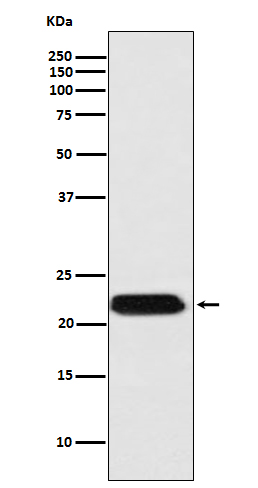
| WB | 咨询技术 | Human,Mouse,Rat |
| IF | 咨询技术 | Human,Mouse,Rat |
| IHC | 咨询技术 | Human,Mouse,Rat |
| ICC | 技术咨询 | Human,Mouse,Rat |
| FCM | 咨询技术 | Human,Mouse,Rat |
| Elisa | 咨询技术 | Human,Mouse,Rat |
| Aliases | FerH; Ferritin; Ferritin H subunit; Ferritin, mitochondrial; Fth3; FTMT; mitochondrial; Mitochondrial ferritin; MTF;;FTMT |
| WB Predicted band size | Calculated MW: 28 kDa ; Observed MW: 22 kDa |
| Host/Isotype | Rabbit IgG |
| Antibody Type | Primary antibody |
| Storage | Store at 4°C short term. Aliquot and store at -20°C long term. Avoid freeze/thaw cycles. |
| Species Reactivity | Human |
| Immunogen | A synthesized peptide derived from human FTMT |
| Formulation | Purified antibody in PBS with 0.05% sodium azide,0.05% BSA and 50% glycerol. |
+ +
以下是3篇与线粒体铁蛋白(FTMT)抗体相关的代表性文献摘要:
---
1. **文献名称**:*Mitochondrial ferritin: a new player in iron metabolism*
**作者**:P. Arosio et al.
**摘要**:该研究首次报道线粒体铁蛋白(FTMT)的发现及其在铁代谢中的独特作用。作者通过特异性抗体证实FTMT定位于线粒体,并揭示其在保护线粒体免受铁诱导氧化损伤中的功能,与胞质铁蛋白形成互补。
---
2. **文献名称**:*Mitochondrial ferritin is elevated in Alzheimer’s disease brains*
**作者**:A. Cozzi et al.
**摘要**:利用免疫组化和Western blot技术,研究者发现阿尔茨海默病患者脑组织中FTMT表达显著上调。抗体的特异性验证表明,FTMT可能通过调节线粒体铁水平参与神经退行性病变机制。
---
3. **文献名称**:*Generation and characterization of a mitochondrial ferritin-specific monoclonal antibody*
**作者**:L. Wang et al.
**摘要**:本文详细描述了一种高特异性FTMT单克隆抗体的开发过程,并通过免疫荧光和质谱验证其仅识别线粒体内的FTMT,为后续研究提供了可靠工具。该抗体在细胞和小鼠模型中成功应用于定位与定量分析。
---
**备注**:若需获取具体期刊信息或发表年份,建议通过PubMed或ResearchGate以作者名及关键词检索。实际引用时请核对文献准确性。
**Background of FTMT Antibody**
Ferritin mitochondrial (FTMT) is an iron-storage protein localized primarily in mitochondria, playing a critical role in regulating cellular iron homeostasis and protecting against oxidative stress by sequestering excess iron. Unlike cytoplasmic ferritin, FTMT is encoded by the *FTMT* gene (also called *FTL2*) and is crucial for mitochondrial iron buffering, heme synthesis, and iron-sulfur cluster biogenesis. Dysregulation of FTMT is linked to mitochondrial dysfunction, oxidative damage, and diseases such as neurodegenerative disorders (e.g., Alzheimer's and Parkinson’s) and certain cancers.
FTMT antibodies are immunological tools designed to detect and quantify FTMT expression in research and diagnostics. They are widely used in techniques like Western blotting, immunohistochemistry, and immunofluorescence to study FTMT's localization, expression patterns, and interactions under physiological or pathological conditions. These antibodies help elucidate FTMT's role in iron metabolism, its response to oxidative stress, and its involvement in disease mechanisms. Recent studies also explore FTMT as a potential biomarker or therapeutic target, particularly in conditions associated with mitochondrial iron overload or oxidative damage. Validated FTMT antibodies are essential for advancing research into mitochondrial-related pathologies and iron dysregulation.
×